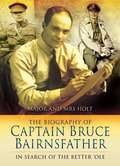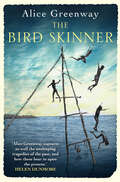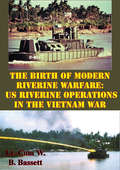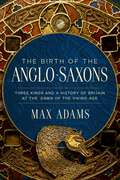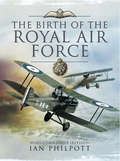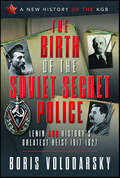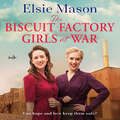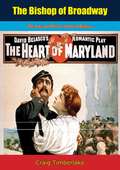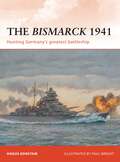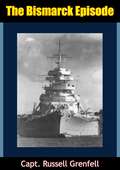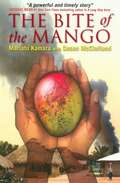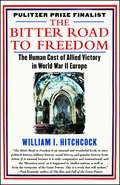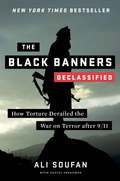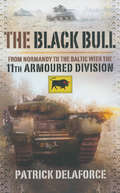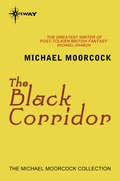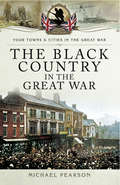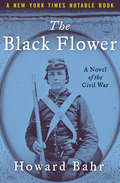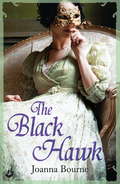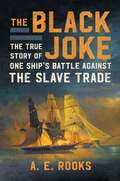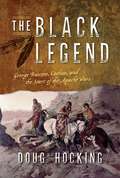- Table View
- List View
The Biography of Captain Bruce Bairnsfather: In Search of the Better 'Ole
by Tonie Holt Valmai HoltBruce Bairnsfather created one of the best-known cartoon characters of the First World War - 'Old Bill' and he drew what many consider to be the most enduring cartoon of all time - the 'Better Ole'.Reprinted due to popular demand this biography was the first to be published about the man and his work. During the First World War the contribution of Bairnsfather's work to the morale of the Nation, through laughter, is without question. Indeed these were those who thought he was the 'man who won the war'. The authors trace his life in fascinating detail. This delightful book reveals details of the man who was a compelling paradox - a desperately shy person who adored the limelight, a loyal loveable personality, ridden with suspicion, an upper class product who was more comfortable in the company of the working class man.Bairnsfather's work appears on plates, cups, jugs, mugs and pots, carmascots, ashtrays and the like - all collector's pieces. His characters appear on postcards, playing cards, cigarette card, jig-saw puzzles and during the Second World War on the noses of the daylight bombers of the American Eighth Airforce.The story is lavishly illustrated with over 150 photographs and drawings, and includes a useful section setting out the range and values of Bairnsfather memorabilia and collectables.
The Bird Skinner
by Alice GreenwayFrom the award-winning author of White Ghost Girls comes an evocative tale of memory, loss—and the redemptive power of friendship. It is 1973. Jim Kennoway, a distinguished ornithologist and World War II veteran, has just left his work at the Natural History Museum in New York, turned his back on his family, and retreated to an island boathouse off the coast of Maine. His desires are simple: to be left alone with his cigarettes, gin, and battered copy of Treasure Island, and to forget. Jim's solitude is shattered when Cadillac Baketi, a tall, ebullient, and dazzlingly bright young woman from the Solomon Islands arrives on her way to study medicine at Yale University. Cadillac is the daughter of Tosca, an island scout Jim befriended during the war when they collected and skinned birds while spying on the Japanese. Jim curses the intrusion as he finds his thoughts catapulting back to his youth and a dark truth about his time in the Solomons. Yet it may be that Cadillac, from the Pacific islands Jim thought he'd left behind, can teach him to be human again.
The Bird in the Tree: Book One of The Eliot Chronicles
by Elizabeth GoudgeEssential reading for fans of E.M. Forster, Mary Stewart and Elizabeth Jane Howard.The first in the classic family saga about the Eliots of Damerosehay. Lucilla Eliot has spent a lifetime making the Hampshire estate of Damerosehay a tranquil haven for her family.When her beloved grandson, David, falls in love with an unsuitable woman, Lucilla sees her most cherished ambitions put at risk. But can she persuade David and Nadine to put duty and family honour before love?What readers are saying about THE ELIOT CHRONICLES'Goudge has produced a truly enchanting world with Damerosehay at its heart. Perfect' - 5 STARS'A delightful 'feel-good' family saga' - 5 STARS'A beautifully-written trilogy' - 5 STARS'Joyful, affirming and uplifting' - 5 STARS'A complete antidote to murder and mayhem!' - 5 STARS
The Birth Of Modern Riverine Warfare: US Riverine Operations In The Vietnam War
by Lieutenant Commander William B. BassettThis paper examines U.S. riverine operations in the Vietnam War. With the current drive to establish a riverine capability within the U.S. Armed Forces as an integral part of the GWOT and small wars of the future, the evolution and operation of the U.S. riverine force during the Vietnam War serves as an effective blueprint for the conduct of modern riverine warfare.American riverine forces in Vietnam operated in a diverse range of brown and green water environments, successfully conducting a wide variety of missions. The evolution of these forces reflected the continuing need to develop the capabilities necessary for these operations. Their success was largely derived from experience which resulted in the creation of a variety of discrete riverine task forces specially configured for their specific missions as the situation dictated. U.S. riverine operations in Vietnam illustrate the complex nature of operations in brown and green water and the inherently joint requirement of the forces involved. The lessons learned as a result of these operations should be incorporated as a fundamental part of the creation of any modern riverine force.
The Birth of Britain (A History of the English-Speaking Peoples, Volume I)
by Winston ChurchillCovers English history to the end of the reign of Richard III. Three additional volumes deal with modern England, its colonies, and modern times. `
The Birth of the Anglo-Saxons: Three Kings and a History of Britain at the Dawn of the Viking Age
by Max AdamsA brilliant, authoritative narrative of the golden age of the Anglo-Saxon kingdom in Britain by an acclaimed historian of this period.The eighth century has for too long been a neglected era in British history: a shadow land between the death of Saint Bede and the triumphs of King Ælfred and the eventual unification of England. But before the victories of King Ælfred against the Viking invaders, the kingdom of Mercia—spread across a broad swathe of central England—was the reigning power that exercised central political authority for the first time since the Roman Empire. This authority was used to construct trading networks and markets; to develop strong economic, cultural, and political links with the Continent; and to lay the foundations for a system of defense that would be invigorated and reinvented by Ælfred at the end of the ninth century. Two kings, Æthelbald (716–757) and Offa (757–796), dominated the political landscape of the rising power of Mercia. During their reigns, monasteries became powerhouses of royal patronage, economic enterprise, and trade. Offa constructed his grandiose dyke along the borders of the warlike Welsh Kingdoms and, more subtly, spread his message of political superiority through coinage bearing his image. But Æthelbald and Offa between them built something with an even more substantial legacy—a geography of medieval England. And these two kings engineered a set of tensions between kingship, landholding, and the church that were to play out dramatically at the dawn of the Viking Age. In this illuminating history of Early Medieval Britain, Max Adams reconnects the worlds of the three kings—Æthelbald, Offa, and Ælfred—in an absorbing study of the landscape, society, and politics of a fascinating century of change.
The Birth of the Palestinian Refugee Problem Revisited
by Benny MorrisBenny Morris' The Birth of the Palestinian Refugee Problem was published in 1988. Its startling revelations about how and why 700,000 Palestinians left their homes and became refugees during the Arab-Israeli war in 1948 undermined traditional interpretations as to whether they left voluntarily or were expelled as part of a systematic plan. This 2004 book represents a revised edition of the earlier work, compiled on the basis of newly-opened Israeli military archives. While the focus remains the 1948 war and the analysis of the Palestinian exodus, the new material contains more information about what happened in Jerusalem, Jaffa and Haifa, and how events there led to the collapse of Palestinian urban society. It also sheds light on the battles and atrocities that resulted in the disintegration of rural communities. The story is a harrowing one. The refugees now number four million and their existence remains a major obstacle to peace.
The Birth of the Royal Air Force
by Ian M. PhilpottIan Philpott presents us here with a compendium of facts, operational histories and photo illustrations, combined to create a comprehensive account of the early years of the Royal Air Force. Illustrated throughout, it features details of all military operations from 1914 to 1918 which impacted upon the organisation. Also included are operational details of the Independent Bomber Force throughout 1918, a supplementary historical strand that is sure to appeal to Aviation enthusiasts with a taste for features of niche focus. Details of the airfields, landing grounds, seaplane bases and various other landmarks of this era are given, and readers are encouraged to use the work as a reference book, being as it is a weighty tome of encyclopedic scope. Sure to make a welcome addition to any aviation enthusiasts library, this well-researched piece of work has been a long time in the making. Philpott brings his typical flare to the project, leaving no stone unturned when it comes to this dynamic, defining period of Royal Air Force history.As featured in the East Kent Mercury and Essence Magazine.
The Birth of the Soviet Secret Police: Lenin and History's Greatest Heist, 1917–1927 (A\new History Of The Kgb Ser.)
by Boris VolodarskyThis book is new in every aspect and not only because neither the official history nor an unofficial history of the KGB, and its many predecessors and successors, exists in any language. In this volume, the author deals with the origins of the KGB from the Tsarist Okhrana (the first Russians secret political police) to the OGPU, Joint State Political Directorate, one of the KGB predecessors between 1923 and 1934. Based on documents from the Russian archives, the author clearly demonstrates that the Cheka and GPU/OPGU were initially created to defend the revolution and not for espionage. The Okhrana operated in both the Russian Empire and abroad against the revolutionaries and most of its operations, presented in this book, are little known. The same is the case with regards to the period after the Cheka was established in December 1917 until ten years later when Trotsky was expelled from the Communist Party and exiled, and Stalin rose to power. For the long period after the Revolution and up to the Second World War (and, indeed, beyond until the death of Stalin) the Cheka’s main weapon was terror to create a general climate of fear in a population. In the book, the work of the Cheka and its successors against the enemies of the revolution is paralleled with British and American operations against the Soviets inside and outside of Russia. For the first time the creation of the Communist International (Comintern) is shown as an alternative Soviet espionage organization for wide-scale foreign propaganda and subversion operations based on the new revelations from the Soviet archives Here, the early Soviet intelligence operations in several countries are presented and analyzed for the first time, as are raids on the Soviet missions abroad. The Bolshevik smuggling of the Russian imperial treasures is shown based on the latest available archival sources with misinterpretations and sometimes false interpretations in existing literature revised. After the Bolshevik revolution, Mansfield Smith-Cumming, the first chief of SIS, undertook to set up ‘an entirely new Secret Service organization in Russia’. During those first ten years, events would develop as a non-stop struggle between British intelligence, within Russia and abroad, and the Cheka, later GPU/OGPU. Before several show ‘spy trials’ in 1927, British intelligence networks successfully operated in Russia later moving to the Baltic capitals, Finland and Sweden while young Soviet intelligence officers moved to London, Paris, Berlin and Constantinople. Many of those operations, from both sides, are presented in the book for the first time in this ground-breaking study of the dark world of the KGB
The Biscuit Factory Girls at War: A new uplifting saga about war, family and friendship to warm your heart this spring
by Elsie MasonHome is where the heart is...Beryl was the first Farley clan bride, finding a home in the arms of loving, attentive, elder son Tony. Yet even now, wrapped in Tony's embrace, Beryl has never quite been able to forget the past she ran away from, nor the shocking family secret she tried to bury. With Tony away fighting the Jerries alongside his brothers, it's up to Beryl and her sisters-in-law to keep the family afloat. Hard, gruelling work doesn't faze her, but the sudden arrival of a devastating letter does... Will Beryl be able to hold her family together and face up to her past? Or will the war take away the one thing she holds most dear - the one person she never thought she deserved?The perfect family saga, set on the Newcastle streets that inspired Catherine Cookson's bestselling classic The Fifteen Streets - This is the second in brand new series for fans of Nancy Revell, Elaine Everest and Daisy Styles.* * * * * * *Readers are LOVING the first Biscuit Factory Girls saga..."Could not put it down" 5*"A brilliant story from a brilliant author" 5*"I enjoyed every bit of this book" 5*"The end had me in tears" 5*"Stays with you long after you've turned the last page" 5*
The Biscuit Factory Girls: A heartwarming saga about war, family and friendship to cosy up with this spring
by Elsie MasonCan Irene find a new home by the docks?Newly married to dashing RAF officer, Tom, Irene Farley leaves behind her safe countryside life to move in with his family by the docks in South Shields. Little prepares her for the devastation the Jerry bombers have wreaked on the Sixteen Streets or that they would be living under her mother-in-law's roof, alongside Tom's three brothers and two wives!Irene's only escape is her job at the local Wright's Biscuit factory packing up a little taste of home for the brave boys fighting for King and country across the channel. As the threat of war creeps ever closer to the Sixteen Streets, the biscuit factory girls bond together, because no one can get through this war alone...
The Biscuit Factory Girls: A heartwarming saga about war, family and the importance of friendship
by Elsie MasonCan Irene find a new home by the docks?Newly married to dashing RAF officer, Tom, Irene Farley leaves behind her safe countryside life to move in with his family by the docks in South Shields. Little prepares her for the devastation the Jerry bombers have wreaked on the Sixteen Streets or that they would be living under her mother-in-law's roof, alongside Tom's three brothers and two wives!Irene's only escape is her job at the local Wright's Biscuit factory packing up a little taste of home for the brave boys fighting for King and country across the channel. As the threat of war creeps ever closer to the Sixteen Streets, the biscuit factory girls bond together, because no one can get through this war alone...
The Bishop of Broadway: The Life and Work of David Belasco
by Craig TimberlakeFirst published in 1954, THE BISHOP OF BROADWAY chronicles the life of David Belasco (1853-1931), an American theatrical producer, impresario, director and playwright who became the first writer to adapt the short story Madame Butterfly for the stage, thereby launching the theatrical career of many actors, including Mary Pickford, Lenore Ulric and Barbara Stanwyck. David Belasco also pioneered many innovative new forms of stage lighting and special effects in order to create realism and naturalism. Owing to his austere, clericlike dress and personal manner, David Belasco came to be known as the “bishop of Broadway.”Born in San Francisco, California, the son of Sephardic Jewish parents who had moved from London, England during the California Gold Rush, Belasco began his illustrious theatre career with a wide variety of jobs in in a San Francisco theatre, and gaining first experience as a stage manager while on the road. This eventually led to a role as stage manager, and he learned the business inside out. A gifted playwright, David Belasco went to New York City in 1882 to work as stage manager for the Madison Square Theatre, and the old Lyceum Theatre while writing plays. By 1895, the “bishop of Broadway” was so successful that he set himself up as an independent producer.During his long creative career, stretching between 1884 and 1930, David Belasco either wrote, directed, or produced more than 100 Broadway plays including Hearts of Oak, The Heart of Maryland, and Du Barry—making him the most powerful personality on the New York city theater scene.Written by fellow Broadway actor, Craig Timberlake, THE BISHOP OF BROADWAY provides an in-depth glimpse into the life and times of this remarkable Broadway figure of the early twentieth century.Beautifully illustrated throughout with black & white photographs.
The Bismarck 1941
by Paul Wright Angus KonstamThe breakout of the German battleship Bismarck into the North Atlantic in May 1941 was one of the most dramatic naval episodes of World War II (1939-1945). It took place at a time when the resources of the Royal Navy were stretched thinly, and the British Home Fleet were hard pressed to counter this powerful German warship, which was vaunted as the most powerful battleship in the world. For nine days she became the most sought-after vessel afloat, as the Home Fleet and Force H, based in Gibraltar, combed the seas in search of her. After days of fruitless searching, the lone German warship was spotted by a reconnaissance aircraft some 300 miles to the south-west of Ireland. Admiral Tovey, who commanded the Home Fleet from his flagship HMS Rodney ordered his warships to intercept her, and a great naval race began, with the Bismarck speeding towards the safety of the French ports, and the British doing their utmost to stop her.Despite overwhelming odds, with most Home Fleet craft too far away to intercept the German ship's flight to France, the Royal Navy ultimately managed to locate, damage and ultimately sink the great German battleship. In this new addition to Osprey's Campaign series, author Angus Konstam sheds new light on this race-to-the-finish, detailing the original plans, the British efforts to locate and damage the Bismarck, the Bismarck's extensive armor systems and her ultimate defeat in a highly illustrated format.
The Bismarck Episode [Illustrated Edition]
by Capt. Russell GrenfellAs breathtakingly exciting as the most thrilling mystery...This epic story begins May 21, 1941, when the British Admiralty received the report that two large German warships had been seen steaming northward through the Kattegat, between Denmark and Sweden. Six days later the shattered hulk of the Bismarck turned bottom up and disappeared beneath the waves a few hundred miles from Brest.In those six days an awe-inspiring drama played itself out. The morale of our British allies was at its lowest ebb. For them, standing alone against the German might, the sinking of the Bismarck was a matter of life and death. But before they could engage her, they had first of all to find her--to hunt her down in the stormy sea-wastes. So mighty an undertaking required some inspired guesswork, and the use of 8 battleships, 2 aircraft carriers, 4 eight-inch gun cruisers, 7 other cruisers, 21 destroyers, and 6 submarines. It also meant the sinking of the battleship Hood and the destroyer Mashona, with the loss of many hundreds of lives.The story of this terrible chase is a story of ups and downs, hopes and anxieties, bitter disappointment and miraculous recovery--a marvelous picture of naval action such as we rarely find in true stories. In addition the battle is illuminated with comments on strategy and tactics which every reader can appreciate. It is hard to imagine that anyone who opens this book will put it down unfinished.Illustrated with maps and plans
The Bite of the Mango
by Mariatu Kamara Susan McclellandThe astounding story of one girl's journey from war victim to UNICEF Special Representative. As a child in a small rural village in Sierra Leone, Mariatu Kamara lived peacefully surrounded by family and friends. Rumors of rebel attacks were no more than a distant worry. But when 12-year-old Mariatu set out for a neighboring village, she never arrived. Heavily armed rebel soldiers, many no older than children themselves, attacked and tortured Mariatu. During this brutal act of senseless violence they cut off both her hands. Stumbling through the countryside, Mariatu miraculously survived. The sweet taste of a mango, her first food after the attack, reaffirmed her desire to live, but the challenge of clutching the fruit in her bloodied arms reinforced the grim new reality that stood before her. With no parents or living adult to support her and living in a refugee camp, she turned to begging in the streets of Freetown. In this gripping and heartbreaking true story, Mariatu shares with readers the details of the brutal attack, its aftermath and her eventual arrival in Toronto. There she began to pull together the pieces of her broken life with courage, astonishing resilience and hope.
The Bitter Road to Freedom: A New History of the Liberation of Europe
by William I HitchcockThe Bitter Road to Freedom is a powerful, deeply moving account of an earth-shattering year in the history of the U.S. and Europe.Americans are justly proud of the role their country played in liberating Europe from Nazi tyranny. For many years, we have celebrated the courage of Allied soldiers, sailors, and aircrews who defeated Hitler's regime and restored freedom to the continent. But in recounting the heroism of the "greatest generation," Americans often overlook the wartime experiences of European people themselves—the very people for whom the war was fought. In this brilliant new book, historian William I. Hitchcock surveys the European continent from D-Day to the final battles of the war and the first few months of peace. Based on exhaustive research in five nations and dozens of archives, Hitchcock's groundbreaking account shows that the liberation of Europe was both a military triumph and a human tragedy of epic proportions. This strikingly original, multinational history of liberation brings to light the interactions of soldiers and civilians, the experiences of noncombatants, and the trauma of displacement and loss amid unprecedented destruction. This book recounts a surprising story, often jarring and uncomfortable, and one that has never been told with such richness and depth. Ranging from the ferocious battle for Normandy (where as many French civilians died on D-Day as U.S. servicemen) to the plains of Poland, from the icy ravines of the Ardennes to the shattered cities and refugee camps of occupied Germany, The Bitter Road to Freedom depicts in searing detail the shocking price that Europeans paid for their freedom.
The Black Banners: How Torture Derailed The War On Terror After 9/11 (Playaway Adult Nonfiction Ser.)
by Ali SoufanThe definitive account of an FBI special agent’s al-Qaeda story, unredacted for the first time. Widely heralded on publication as a "must-read" (Military Review) and "important window on America’s battle with al-Qaeda" (Washington Post), Ali Soufan’s revelatory account of the war on terror as seen from its front lines changed the way we understand al-Qaeda and how the United States prosecuted the war—and led to hard questions being asked of our leaders. When The Black Banners was published in 2011, significant portions of the text were redacted. After subsequent review by the Central Intelligence Agency, those redactions have been lifted. Their removal corrects the record on how vital intelligence was obtained from al-Qaeda suspects and brings forth important new details on the controversial use of enhanced interrogation techniques (torture) to extract information from terror suspects. For many years, proponents of the use of these techniques have argued that they produced actionable intelligence in the war on terror. This edition of The Black Banners explodes this myth; it shows Soufan at work using guile and intelligent questioning—not force or violence—to extract some of the most important confessions in the war, and it vividly recounts the failures of the government’s torture program. Drawing on Soufan’s experiences as a lead operative for the FBI and declassified government records, The Black Banners (Declassified) documents the intelligence failures that lead to the tragic attacks on New York and Washington, DC, and subsequently how torture derailed the fight against al-Qaeda. With this edition, eighteen years on from the first sanctioned enhanced interrogation technique, the public can finally read the complete story of what happened in their name after the events of 9/11. The Black Banners (Declassified) includes a new foreword from Ali Soufan that addresses the significance of the CIA’s decision to lift the redactions.
The Black Bull: From Normandy to the Baltic with the 11th Armoured Division (Stackpole Military History Ser.)
by Patrick DelaforceThis WWII history chronicles the legendary British Armored Division in combat across northern Europe with veterans&’ personal recollections. The British Army&’s 11th Armored Division, famous for its Black Bull insignia, was famous for its courageous fighting during the Second World War. In this volume, Black Bull veterans tell the story of their Division in their own words. Beginning with the Normandy invasions, they vividly describe the role they played in Operations Epsom, Goodwood and Bluecoat. They bring readers with them on the &“Great Swan' through France and Belgium; the taking of Antwerp; Operation Market Garden; and the final slog into Germany across well-defended river barriers. They also recount stories of casualties and losses, the hardships of a winter campaign, and the comradeship and bravery it takes to persevere. Historian Patrick Delaforce provides a historical narrative that gives context to the personal accounts. Twelve Black Bull regiments are represented, with memories from troop commanders and riflemen, bombardiers and signalmen, tank crews, troop leaders, as well as the Division&’s GOC, Major-General G.P.B. Roberts. The text is supplemented throughout with wartime photographs showing the Division in action.
The Black Corridor
by Michael MoorcockThe world is sick. The Forces of Chaos have energised the planet. Leaders, führers, duces, prophets, visionaries, gurus, and politicians are all at each others' throats. And Chaos leers over the broken body of Order.So Ryan freezes his family into suspended animation and sets off for the planet Munich 15040, five years distant. There he will re-establish Order in a New World - and create a happier, healthier, saner and more decent society with the ones he loves.But they are suspended. And they cannot talk. And he is alone in space. And he has been travelling for three years. And he will still be travelling two years hence, and he cannot see his destination, and he is ALONE and LOST and CRACKING UP...
The Black Country in the Great War (Your Towns & Cities in the Great War)
by Michael PearsonThis is not a book about the Great War; it is about life during the war. Changes in people's lives: their work, home, food, entertainment and news. I used original research material including newspapers, to paint a picture of life in the Black Country.Manufacturing was vital; we were well-equipped to supply the engines of war. The region had motor manufacturers who made aero engines, tanks, guns, munitions and much more. Towards the end of the war the Black Country became one huge munitions works!Some of the greatest changes were societal, women's role changed massively. Wider social change involved the first steps towards equality between the sexes. By 1918 women could vote and stand as MPs. At work, women became clerks, tram drivers, munitions workers and more. With so many men away, without women the war could not have been won.This was the first modern conflict, truly the First World War, where troops globally converged, mainly on France and Belgium, to fight a common enemy. It began in August 1914 amid much excitement and the initial months saw the British Army grow hugely. There were those who did not want to fight, their circumstances will be examined, as well as methods used to 'encourage' them to sign up.The war developed into trench warfare, with heavy casualties, vastly more than thought imaginable. Most Black Country families lost one or more of their loved ones; but there was little time to mourn; in many cases reports were not made public for some time; a well-oiled propaganda machine saw that news did not seriously damage morale.In 1916 war came to the Black Country through a Zeppelin raid. Its affect was devastating and impacted widely as restrictions were placed on lighting and other measures to minimise the effects of probable future raids. By 1917 the Black Country had to cope with more wounded from the front line. Hospitals were full and further measures were needed to accommodate our returning injured heroes. Treatment, feeding and entertainment for the wounded are all examined. Indeed, generally food supply was of concern from day one of the war. Prices rose, supply became short, there were riots protesting about 'profiteering' and eventually rationing was imposed. Alcohol supply was strictly controlled, pubs closed for a period during the day, to stop essential workers neglecting their duties. This change illustrates how life in Britain changed; it was the 1980s before this restriction on pub opening hours was finally lifted.By 1917 the war became a marathon, with no end in sight. The Government sought innovative means to raise money and the Black Country played its part in supporting those initiatives. Local charities raised funds through events including football matches, ftes, collections and more to provide money for good causes. Parcels to prisoners of war, troops serving at the front and the wounded were all catered for. Christmas traditions were preserved, mainly for the children, with parties for those whose father was away at war.
The Black Flower: A Novel of the Civil War
by Howard BahrA Confederate soldier confronts the horror of battle and the power of grace in this &“poignant, haunting, and important&” novel of the Civil War (The Tennessean, Nashville). A New York Times Notable Book and Winner of the William Boyd Award for Best Military Novel In November 1864, Gen. John Bell Hood&’s Army of Tennessee prepares to launch an assault on Union forces near Franklin, Tennessee. Dirty, exhausted, and hungry, the Confederate soldiers form a line of battle across an open field. Among them stands Pvt. Bushrod Carter, a twenty-six-year-old rifleman from Cumberland, Mississippi. Against all odds, Bushrod has survived three years of war unscathed—but his luck is about to run out. Wounded in the battle, Bushrod is taken to a makeshift hospital on a nearby plantation. There, he falls under the care of Anna Hereford, who bears her own scars from years of relentless bloodshed and tragedy. In the grisly aftermath of one of the Confederate army&’s most disastrous campaigns, Anna and Bushrod seek salvation and understanding in each other. Their fragile bond carries with it the hope of a life beyond the war, and the risk of a pain too devastating to endure. Written with profound empathy and meticulous attention to historical detail, The Black Flower brilliantly portrays the staggering human toll of America&’s bloodiest conflict. In his award-winning debut novel, &“Howard Bahr casts a tale of war as powerful as any you&’ll ever find&” (Southern Living).
The Black Hawk: Spymaster 4 (Spymaster)
by Joanna BourneJoanna Bourne returns to the French Revolution, pairing espionage and burning romance to create an unforgettable love story. For fans of Stephanie Laurens, Elizabeth Hoyt and Poldark, this is a must-read.He is her enemy. He is her lover. He is her only hope.Someone is stalking agent Justine DeCabrillac through London's grey streets. Under the cover of rain, the assassin strikes - and Justine staggers to the door of the one man who can save her. The man she once loved. And the man she hated: Adrian Hawkhurst.Adrian wanted the treacherous beauty known as 'Owl' back in his bed, but not wounded and clinging to life. Now, as he helps her heal, the two must learn to trust each other to confront the hidden menace that's trying to kill them - and survive long enough to explore the passion simmering between them once again...For more spellbinding Spymasters romance, look for the other titles by Joanna Bourne: The Forbidden Rose, The Spymaster's Lady, My Lord and Spymaster, and Rogue Spy.
The Black Joke: The True Story of One Ship's Battle Against the Slave Trade
by A.E. RooksA groundbreaking history of the Black Joke, the most famous member of the British Royal Navy&’s anti-slavery squadron, and the long fight to end the transatlantic slave trade.The most feared ship in Britain&’s West Africa Squadron, His Majesty&’s brig Black Joke was one of a handful of ships tasked with patrolling the western coast of Africa in an effort to end hundreds of years of global slave trading. Sailing after the spectacular fall of Napoleon in France, yet before the rise of Queen Victoria&’s England, Black Joke was first a slaving vessel itself, and one with a lightning-fast reputation; only a lucky capture in 1827 allowed it to be repurposed by the Royal Navy to catch its former compatriots. Over the next five years, the ship&’s diverse crew and dedicated commanders would capture more ships and liberate more enslaved people than any other in the Squadron. Now, author A.E. Rooks chronicles the adventures on this ship and its crew in a brilliant, lively narrative of the history of Britain&’s suppression efforts. As Britain slowly attempted to snuff out the transatlantic slave trade by way of treaty and negotiation, enforcing these policies fell to the Black Joke and those that sailed with it as they battled slavers, weather disasters, and interpersonal drama among captains and crew that reverberated across oceans. In this history of the daring feats of a single ship, the abolition of the international slave trade is revealed as an inexplicably extended exercise involving tense negotiations between many national powers, both colonizers and formerly colonized, that would stretch on for decades longer than it should have. Harrowing and heartbreaking, The Black Joke is a crucial and deeply compelling work of history, both as a reckoning with slavery and abolition and as a lesson about the power of political will—or the lack thereof.
The Black Legend: George Bascom, Cochise, and the Start of the Apache Wars
by Doug HockingIn 1861, war between the United States and the Chiricahua seemed inevitable. The Apache band lived on a heavily traveled Emigrant and Overland Mail Trail and routinely raided it, organized by their leader, the prudent, not friendly Cochise. When a young boy was kidnapped from his stepfather&’s ranch, Lieutenant George Bascom confronted Cochise even though there was no proof that the Chiricahua were responsible. After a series of missteps, Cochise exacted a short-lived revenge. Despite modern accounts based on spurious evidence, Bascom&’s performance in a difficult situation was admirable. This book examines the legend and provides a new analysis of Bascom&’s and Cochise&’s behavior, putting it in the larger context of the Indian Wars that followed the American Civil War.
